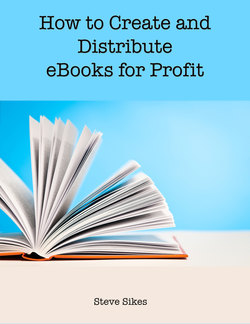Читать книгу How to Create and Distribute Ebooks for Profit - Steve Sikes - Страница 4
На сайте Литреса книга снята с продажи.
ОглавлениеChapter 1
Writing Your Book
While this book will not go into great depth concerning the actual writing portion of your book, there are some important notes that you’ll need to know before you start hammering out those pages. Doing things right from the beginning is imperative to being successful as an indie author.
Write the Book You Want, Within Reason
Whether you’re more interested in writing fiction or nonfiction, sci-fi or romance, paranormal or urban fantasy, choose the genre that appeals most to you. However, be aware of the industry trends and the general size of the audience you’re writing to, because it will make a significant difference in your ultimate success.
For example, if you’re writing paranormal romance, you’re atop the crest of the wave in today’s genre fiction. Yes, paranormal romance is, well, hot (pun intended). However, not all genres have the same audience size, nor are all audiences embracing eBooks equally. You’ll find that fans of traditional fantasy still prefer paper books to their e-kin (that’s a really compelling reason to look into print-on-demand when you get your book done).
Realize that the size of the audience and their willingness to buy books outside traditional venues (B&N stores, for instance) will make a difference in how many copies you sell and how successful your book is. Write what you want, but with an eye toward market trends and audience size/buying habits, at least if you want to turn a profit on your book. If you’re not interested in making money, then all options are fair game.
You Need Beta Readers
If you spend much time speaking with other indie authors online (whether on GoodReads, Facebook or Twitter), you’ll find that many use what are called beta readers. You need a group of betas on your side during and immediately after the writing process.
What’s a beta reader? Essentially, a beta is nothing more than a reader who agrees to provide critical feedback about a work either after the book is finished, but before final formatting and publication, or throughout the writing process. Why do you need beta readers?
It’s difficult enough for an author to catch typos and misspellings. It’s even harder for the author to catch plot holes, characters who wander away from their personalities during the course of the story and other problems. This is where your beta readers come in.
You need a decent group of readers, drawn from many different backgrounds, and who are willing to provide you with honest, direct (and sometimes unwanted) feedback. They need to be brutally honest with you – that should immediately nix your spouse, your mom or your best friend. Those aren’t valid betas because their feedback can often be suspect. They’re more likely to tell you how much they loved it, just because they’re proud of you or don’t want to hurt your feelings. Hurt feelings are part and parcel of the writing process, so get yourself a group of dedicated beta readers who aren’t family or close friends.
Ideally, you’ll have three to five readers with differing backgrounds. You might be able to rope in a couple of regular readers for the “Average Joe” report on the book, as well as an author or two for a professional opinion. You also need someone with decent grammar skills on your side. Once you’ve “finished” your book, send it to your beta readers and then incorporate their feedback.
A Word on Editing
It can be pretty tempting to self-edit your book, or to rely on your beta readers to catch all the issues that relate to style and grammar. Resist that temptation. Unless you have highly professional beta readers (those who do this sort of work for a living), they’re not going to catch all the problems. In addition, there’s more to professional editing than just making sure your I’s are dotted and your T’s are crossed.
A professional editor can help spot plot holes, suggest alternatives, give you invaluable feedback about character motivation and much more. Think of an editor more as a collaborative partner in the writing process, rather than just a human version of spell check, and you’ll get the idea.
Do you need an editor? Yes, you do. One of the most serious complaints readers have about indie books is their lack of proofing and editing – you don’t want your book lumped in with those. Even just a few comments about typos and poor editing can kill your book’s sales, and that’s not something you can afford.
Before you do anything in terms of distribution, make sure your book has been professionally edited. The cost might actually surprise you. While there will be a price, you can find professional editors for surprisingly affordable rates.
